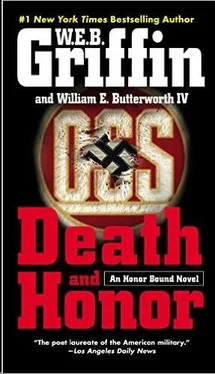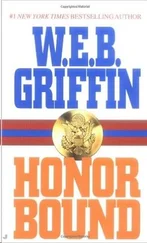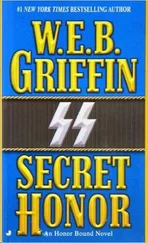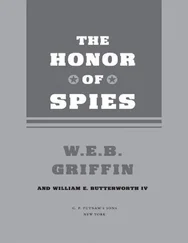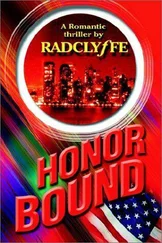Griffin W.E.B. - Honor Bound 04 - Death and Honor
Здесь есть возможность читать онлайн «Griffin W.E.B. - Honor Bound 04 - Death and Honor» весь текст электронной книги совершенно бесплатно (целиком полную версию без сокращений). В некоторых случаях можно слушать аудио, скачать через торрент в формате fb2 и присутствует краткое содержание. Год выпуска: 2009, Издательство: Penguin USA, Inc., Жанр: Старинная литература, на английском языке. Описание произведения, (предисловие) а так же отзывы посетителей доступны на портале библиотеки ЛибКат.
- Название:Honor Bound 04 - Death and Honor
- Автор:
- Издательство:Penguin USA, Inc.
- Жанр:
- Год:2009
- ISBN:нет данных
- Рейтинг книги:4 / 5. Голосов: 1
-
Избранное:Добавить в избранное
- Отзывы:
-
Ваша оценка:
- 80
- 1
- 2
- 3
- 4
- 5
Honor Bound 04 - Death and Honor: краткое содержание, описание и аннотация
Предлагаем к чтению аннотацию, описание, краткое содержание или предисловие (зависит от того, что написал сам автор книги «Honor Bound 04 - Death and Honor»). Если вы не нашли необходимую информацию о книге — напишите в комментариях, мы постараемся отыскать её.
Honor Bound 04 - Death and Honor — читать онлайн бесплатно полную книгу (весь текст) целиком
Ниже представлен текст книги, разбитый по страницам. Система сохранения места последней прочитанной страницы, позволяет с удобством читать онлайн бесплатно книгу «Honor Bound 04 - Death and Honor», без необходимости каждый раз заново искать на чём Вы остановились. Поставьте закладку, и сможете в любой момент перейти на страницу, на которой закончили чтение.
Интервал:
Закладка:
The Americans got into combat in North Africa in November 1942. The original action—heavy combat—was not, however, against the Germans. It was against the French.
Although many Americans believed—and the Office of War Information tried to convince them—that the U.S. Army would be welcomed in French North Africa, others were far from sure about that.
They remembered that in 1940 many French had cried “Better Hitler Than Blum,” making reference to a French socialist politician. They knew there were large numbers of French who believed Germany was probably going to win the war, and that the Germans were having little trouble in finding Frenchmen to volunteer for the Charlemagne Legion of the SS.
The Germans had permitted most of the French fleet—a potentially formidable force—to sail to the then-French protectorate of Casablanca, Morocco, where it and French army and air forces in North Africa remained armed and under French command, subject only to the supervision of a small number of Germans in the Armistice Commission. The French fleet, if so inclined, or pressured by the Germans, could hamper—or even deny—British and American passage from the Atlantic Ocean to the Mediterranean.
Agents of the United States Office of Strategic Services (OSS) sent to North Africa undercover as consular officers reported that while they had had some success in establishing contact with French officers and convincing many of them that France and the United States had a common interest in defeating Nazi Germany, they had by no means convinced all of them.
The Americans, under the command of Major General George S. Patton, hoped of course to put the troops of Operation Torch ashore in Morocco without having to fight to do so. The plan called for a force of nine thousand men to land north of Port Lyautry, north of Casablanca, to take the airport. Simultaneously, an eighteen-thousand-man force with eighty tanks would land at Fedela, and a third force of six thousand men and one hundred tanks would land at Safi and march on Casablanca from the south.
The invasion began at midnight 8 November 1942. It took the French several hours to mobilize their forces—OSS agents had some success in having various French units respond very slowly, or not at all, to their orders to do battle—but by 0600 it was apparent the French were not only not going to welcome the Americans as liberators, but had already begun to cause casualties in the landing force.
At 0617, Patton issued the shoot-back order: “Play Ball.”
At 0700, U.S. Navy aircraft from the carrier USS Ranger reached Casablanca harbor as five French submarines sailed out to battle the American fleet. There was a dogfight. Seven French aircraft went down in flames, as did five U.S. Navy Wildcats.
At 0804, as surface vessels of the French fleet prepared to leave the Casablanca harbor, the battleship USS Massachusetts opened fire with her massive sixteen-inch cannon. In ten minutes, thirteen French vessels—submarines, freighters, and passenger ships—were on the bottom of Casablanca’s harbor, and many French warships had been damaged. The commanding officer of the French cruiser Albatross was killed by U.S. Navy gunfire.
In the next thirty-six hours, with negligible damage to themselves, the USS Massachusetts, the cruisers USS Augusta, USS Brooklyn, USS Tuscaloosa, and USS Wichita, and aircraft from the carrier USS Ranger either sank or knocked out of action most of the French fleet, including the battleship Jean Bart and the cruisers Primaguet, Fougueux, Boulonnais, Brestois, and Frondeur.
At this point, French army and naval officers who were still willing—if not entirely able—to resist the invasion were convinced by French officers who had been dealing with American OSS agents that raising the white flag was really in the best interests of France.
U.S. forces, including those landed elsewhere in North Africa, began a march toward Egypt to join the British fighting Rommel’s Afrikakorps.
In Russia meanwhile—on 23 November 1942, two weeks after the American landings in North Africa—the quarter-million-man German Sixth Army, which had been trying to take Stalingrad since August, was surrounded by Soviet forces. Two weeks later, General Friedrich von Paulus informed Hitler he had received an ultimatum from the Russian commander, Marshal Rokossovsky, calling for his surrender. Von Paulus reported that his forces, ill-equipped to fight in weather thirty degrees below zero Fahrenheit, were exhausted, just about out of ammunition, and reduced to eating their horses.
Hitler forbade surrender.
On 31 January 1943, Hitler promoted von Paulus to field marshal and suggested to him that if he did wish to become the first German field marshal ever to surrender, there was the option of suicide. Von Paulus declined, and within hours was captured by the Red Army. The very last of his troops surrendered on 2 February.
Not two weeks later, on 14 February 1943, the German army, under General Eric Rommel, fought U.S. forces for the first time. The Germans proved a far tougher adversary than the French. The German counterattack to stop the American drive across North Africa lasted six days, ending 20 February in a bloody defeat of the U.S. II Corps’s Fourth Infantry Division and its supporting forces at a two-mile gap in the Dorsal Atlas Mountains in central Tunisia called the Kasserine Pass.
German Tiger and Mark IV tanks mounting 88mm cannon were far superior to the U.S. M3 and its 75mm weapon, which was nontransversing and, moreover, riveted rather than welded. When hit, the rivets came loose and ricocheted around the tank interior, usually killing all of the crew.
German battlefield discipline proved far superior to American.
One thousand Americans died and hundreds more were taken prisoner, and most of their artillery and heavy equipment was lost.
General Dwight D. Eisenhower, the overall commander, took drastic action. The II Corps commander was relieved, and George S. Patton, promoted to lieutenant general, was rushed to Tunisia to replace him and turn the situation around. He began to do so by ordering the immediate application of the cavalry tactic that officers lead from the front.
Patton also understood the tactical use of aviation. On 23 February, a massive U.S. bombing attack on Rommel’s forces drove him back through the Kasserine Pass, on a retreat that ended only when he reached prepared positions on the Mareth Line.
There was no longer any question whether the Americans could successfully fight the Germans.
Or that they could stay in North Africa.
The war was going on, too, near the southern tip of the South American continent, in Argentina and Uruguay. Cities were not being bombed into rubble, cannons were not roaring, and no one was going hungry or freezing to death. But both the Axis and the Allies realized the importance of these “neutral countries” both to the war effort and, as importantly, to what would happen when victory and defeat came.
Buenos Aires (“nice breezes”), the capital of Argentina, was a large European-looking city one-hundred-odd miles across the Río de la Plata (“silver river”) from Montevideo, Uruguay. Both cities were a very long way from the battles raging at Guadalcanal (8,500 miles), Stalingrad (8,200 miles), and the Kasserine Pass (6,500 miles); and from Berlin (7,400 miles), London (6,900 miles), and Washington, D.C. (5,200 miles).
By comparison, it was only 577 miles from London to Berlin, 829 miles from Berlin to Stalingrad, and 1,100 miles from Berlin to the Kasserine Pass.
Читать дальшеИнтервал:
Закладка:
Похожие книги на «Honor Bound 04 - Death and Honor»
Представляем Вашему вниманию похожие книги на «Honor Bound 04 - Death and Honor» списком для выбора. Мы отобрали схожую по названию и смыслу литературу в надежде предоставить читателям больше вариантов отыскать новые, интересные, ещё непрочитанные произведения.
Обсуждение, отзывы о книге «Honor Bound 04 - Death and Honor» и просто собственные мнения читателей. Оставьте ваши комментарии, напишите, что Вы думаете о произведении, его смысле или главных героях. Укажите что конкретно понравилось, а что нет, и почему Вы так считаете.
